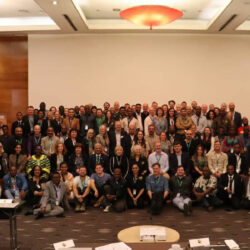Ecosphere Publishes Study: Modelling tools can effectively assess wild cheetah populations even in the face of uncertainty
-

- by CCF Staff August 15, 2013
FOR IMMEDIATE RELEASE
Contact:
Liz Georges, Communications Coordinator, liz@cheetah.org
Dr. Laurie Marker, Founder and Executive Director, cheetah@iway.na.
August 15, 2013 (OTJIWARONGO, Namibia) – Ecosphere, a journal of the Ecological Society of America, has published “Modeling the viability of the free-ranging cheetah population in Namibia: an object-oriented Bayesian network approach,” a study that evaluates the utility of object-oriented Bayesian networks as a tool for assessing cheetah populations. The study utilized information from Cheetah Conservation Fund’s experts and sophisticated Bayesian models to show how the applied modelling technique could integrate information from varied sources and varying probabilities to produce a coherent model to assess the viability of the cheetah population in Namibia.
Assessing a threatened population such as the cheetah requires the synthesis of data from several areas, including ecological data, biological data and population management data. The information available to conservationists is often varying in quantity and quality, and in some cases, non-existent. The Bayesian modelling techniques employed in the study allow conservationists to use diverse datasets of varying quality, and still confidently make decisions. Bayesian networks can successfully integrate all the available data from varying sources, and the model and parameters can be refined as new research or information is acquired.
“What’s exciting about this study is that it gives us a new tool to help us understand, design and evaluate conservation programming,” says Dr. Laurie Marker, one of the authors of the study and the Founder and Executive Director of the Cheetah Conservation Fund. “When a species is threatened, time is running out, and tools that allow you to make solid decisions about how to save that species even in the face of uncertainty are critical to win the race against extinction.”
The study was authored by Sandra Johnson, Laurie Marker, Kerrie Mengersen, Chris H. Gordon, RG Melzheimer, Anne Schmidt-Küntzel, Matti Nghikembua, Ezequiel Fabiano, Josephine Henghali, and Bettina Watcher. Laurie Marker is the Founder and Executive Director of Cheetah Conservation Fund. Anne Schmidt-Küntzel is CCF’s Research Geneticist and Assistant Director for Animal Health and Research, Matti Nghikembua is CCF’s Senior Ecologist and Education Officer, and Ezequiel Fabiano is CCF’s Senior Research Assistant. A full copy of the study is available online here: https://cheetah.org/resource-library/ecosphere-publishes-study-modelling-tools-can-effectively-assess-wild-cheetah-populations-even-in-the-face-of-uncertainty/
Editors’ Notes
Founded in Namibia (Africa) in 1990, Cheetah Conservation Fund (CCF) , which is dedicated to saving the cheetah in the wild, is the global leader in research and conservation of cheetahs.
CCF’s Founder and Executive Director, Dr. Laurie Marker, an American biologist, is considered one of the world’s foremost experts on cheetah biology, ecology and conservation collecting data on over 800 wild cheetahs and releasing over 600 back into the wild. CCF’s conservation strategy has contributed to increasing the wild cheetah population in Namibia by ~50%.
The cheetah is Africa’s most endangered big cat with ~10,000 cheetahs remaining. Cheetah populations continue to decline throughout their range in Africa due to habitat and prey loss. This situation is exacerbated in poor rural areas where subsistence farming practices can lead to increased farmer-cheetah conflict, with serious consequences on both sides. Cheetah survival is therefore dependent on helping subsistence farmers to improve their management practices, for the benefit of all. CCF encourages a unified and systematic approach to cheetah conservation studies and analyses and monitor the factors affecting the cheetah’s survival in the wild. CCF’s results are used to develop conservation policies and change public attitudes to allow predator and humans to co-exist.
CCF collaborates with universities in Namibia and internationally and engages students in both applied and basic research encouraging publication of their work. CCF takes students and volunteers in fields of biology, ecology, veterinary medicine, agriculture, tourism, education, and business.
CCF is a registered non-profit in Namibia, Canada, UK and the US, where it is listed as a “Four Star Charity” by Charity Navigator, which recognises sound fiscal management and commitment to accountability and transparency. People can learn more about CCF or make a donation to the organisation by visiting www.cheetah.org.
Related Reading


